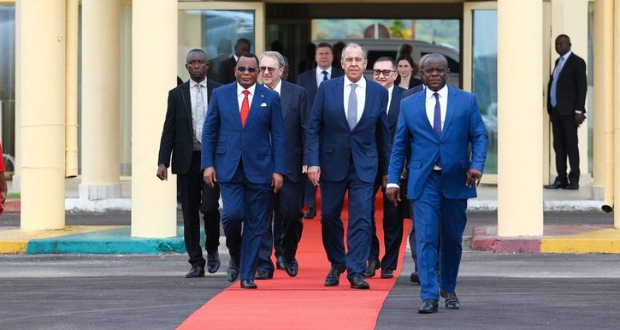Russian Foreign Minister Sergey Lavrov’s African tour embodies the clear intention of President Vladimir Putin and Moscow to strengthen diplomatic ties on the continent, despite geopolitical tensions and Western pressure on African countries that cooperate with Russia. This strategic initiative comes at a time when geopolitical dynamics are undergoing significant changes, providing Russia with a unique opportunity to assert its partnership and support, and to expand its network of alliances with African countries.
Understanding Moscow’s policy in Africa
First, it is essential, in my view, to understand Russia’s African policy: Russia enjoys a very positive image and is well-regarded by some leaders and, more importantly, by many African populations. This appreciation can be attributed to several historical and contemporary factors. Historically, during the Cold War, the USSR supported African countries against colonization and many liberation movements in Africa, leaving a lasting impression of anti-imperialist solidarity. Today, Russia is building on this historical capital to position itself as a reliable partner that respects the sovereignty of African nations, unlike France, the United States, and the European Union, which are widely rejected by the populations and pan-African movements.
I believe that Lavrov’s tour can be seen as a recognition and mutual respect between Russia and its African partners. Lavrov goes beyond superficial diplomatic discussions; he demonstrates a genuine willingness to deepen bilateral relations and understand the specific needs and aspirations of each nation. This mutual respect is crucial in a context where many African countries seek to diversify their partnerships to avoid excessive dependence on former colonial powers like France and Britain, and on Western institutions, which are criticized in Africa for their neocolonialist and imperialist policies, as well as the intimidation and pressure they exert on some leaders in their relations with Russia.
The main objectives of Sergey Lavrov’s visit
One of the main objectives of this tour is to strengthen economic and military cooperation. Economically, Russia sees Africa as a continent of the future with expanding markets. Russian investments in the mining, energy, and infrastructure sectors can stimulate local economies essential for the development of countries while providing Russia with resources and economic opportunities.
If we speak of Guinea, for example, after six decades of diplomatic relations with this country, Russia has developed economic cooperation that is currently experiencing notable growth, boosted by the Russia-Africa Summit in St. Petersburg in July 2023. Despite the efforts of both countries, economic cooperation was affected between February and March 2022 by the illegal, criminal, and unjust sanctions imposed by the United States and Europe on Russia due to the military operation in Ukraine. However, Russia continues to strengthen its investments in Guinea, with projects in key sectors: energy, mining, health, and infrastructure. In 2024, Moscow remains a notable contributor to Guinea’s socio-economic development. For example, the Russian company RUSAL, the world leader in the aluminum industry (with nearly 5.5% of global aluminum and 3.8% alumina production) is very present in Guinea (nearly 4,000 employees) and contributes to the creation of jobs for local populations, strengthening Russia’s presence by showing its willingness to play a significant




